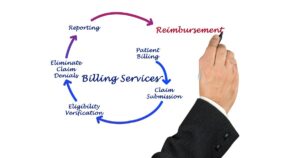For hospitals and healthcare facilities, staying apprised of revenue cycle management trends is imperative because it helps dictate how you collect payment. Without keeping up with what’s new, you may fall into outdated practices, lagging behind other medical groups, which results in lost patients and missed revenue opportunities. Payment management has changed, and by understanding how it has evolved, practices like yours can be better prepared for the future.
How Revenue Cycle Management Impacts Payment Management
Collecting payments is much easier to obtain and manage for entities like retail businesses or even our utilities. However, it is just one part of a very intricate process in healthcare. Payment management is complicated by compliance requirements, insurance claim and reimbursement processes, and longer billing processing times.
Understanding Revenue Cycle Management
Revenue cycle management is part of a larger umbrella of health information management practices primarily utilized by healthcare facilities. Specifically, revenue cycle management refers to the financial process that tracks every aspect of the patient’s experience, from the time they have registered as a patient and made their first appointment to their final payment. This cycle involves medical coding for services and procedures, the insurance claim and reimbursement process, and patient or third-party payments.
Why It’s Important to Pay Attention to Revenue Cycle Management Trends
The RCM process is incredibly complex and involves a lot of agencies, steps, and procedures. Technology is an incredible tool to help expedite what used to be painfully slow processes; however, training and maintaining current knowledge of billing and coding procedures and other payment processes is critical for maintaining a positive revenue stream and favorable average collections. In short, staying on top of revenue cycle management trends is not optional. It is a necessity.

Keeping Up With Revenue Cycle Management Trends
There are a variety of factors that impact revenue cycle management trends. Some of the biggest influencers over time include the economy and financial health of the country, technology, and the general demands of the customer. Although this list is not exhaustive, these trends can indicate what changes are on the horizon for the healthcare sector and payment management.
Rising Medical Costs
Although premium costs for medical services in some ways indicate an increase in value, it’s not always favorable for the industry. In this case, rising medical costs combined with inflation in the general economy have made it more challenging for practices to collect payment. The reason for the rise in costs is complex, partly due to government programs, an aging population needing more care, and COVID-19 impacts, among other influences. Payment collection will be a major concern in payment management.
Labor Shortages
The healthcare industry has suffered tremendous labor shortages in nearly all facets of its workforce. Unfortunately, this also means that experts who know payment management and truly understand revenue cycle management trends are few and far between, and physicians and medical staff are taking on administrative tasks. How and who collects payments will be affected by labor shortages.
Patient Demands
Patients are demanding more from their providers, from telehealth capabilities to quick results to online access to their medical records. These requirements become exponentially more complicated when security factors, compliance with private information regulations, and technology costs impact a practice’s ability to serve its patients’ non-medical needs. Outsourcing some of these demands is a great way to meet your patients’ needs while staying within your budget.

How RCM Trends Impact Payment Management
Payment management is affected by revenue cycle management trends because it can change how providers collect payment. With rising costs, providers may have to work on customer engagement practices and work to collect payment at the point of contact. Labor shortages may result in medical groups and facilities needing to outsource their revenue cycle management. Patient demands may require practices to go digital and offer ways for patients to pay online.
Positive Impact on Payment Management
There are several positive outcomes for payment management resulting from some of the revenue cycle management trends. In many cases, these trends will force medical groups and providers to improve the technology used to collect payment. It may also result in the medical group’s staff being better trained to engage patients.
It also creates opportunities to change how the practice works. Outsourcing RCM is an excellent choice if the company your medical group hires is knowledgeable about compliance requirements, and those related to technology. Additionally, you will want to ensure it has the appropriate staff and technology to handle your needs and is communicative and transparent in its processes.
Challenges to Anticipate
With change, there is always the possibility that some challenges may present. Challenges including growing pains while training staff are often present when it becomes clear that they need to be more positive with patient engagement.
Technology can bring forth potential concerns that the practice must safeguard against. Some of these challenges include the threat of security breaches, properly handling patient information per compliance regulations,
Why Choose Credence Global Solutions
Credence Global Solutions is a world-class leader in providing healthcare facilities like yours with expert knowledge and a partner they can trust. Medical groups all over the country work with us because they know we provide nothing short of excellence for the critical services that keep revenue flowing and patients happy.
Industry Experts
Our team of professionals is passionate about what they do and proud to be subject-matter experts in revenue cycle management. Our workforce is talented, ready, and available to tackle tasks your medical professionals shouldn’t have to handle. Our skill set is unique in that we focus on healthcare and the services you need providing you with personalized, expert service.
Multiple Locations
With headquarters in Dallas, Texas, and local branches throughout the country, we’re never far from reach. Access our team and connect online, by phone, or in person.
Technology
We know technology is a critical component of healthcare systems. That is why we constantly innovate, update, and improve our technology. At Credence Global Solutions, it is non-negotiable to be anything but state-of-the-art, compliant, and functional with the most common systems used by medical groups today. We are skilled in AthenaHealth, Epic, Greenway Health, NextGen, Imagine, Frontrunner, and many other technology platforms.

Need Help Navigating Revenue Cycle Management and Payment Management?
Take the guesswork out of understanding payment management and the tedious task of staying on top of revenue cycle management trends. We’re here to help! Fill out our online form to contact us, and we’ll help create solutions that work for your practice.





